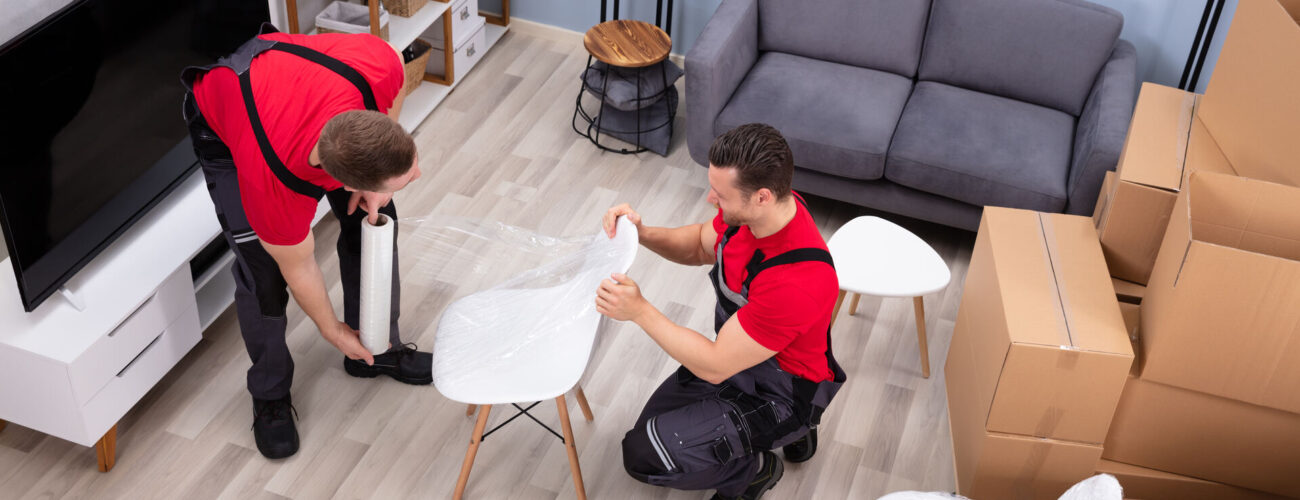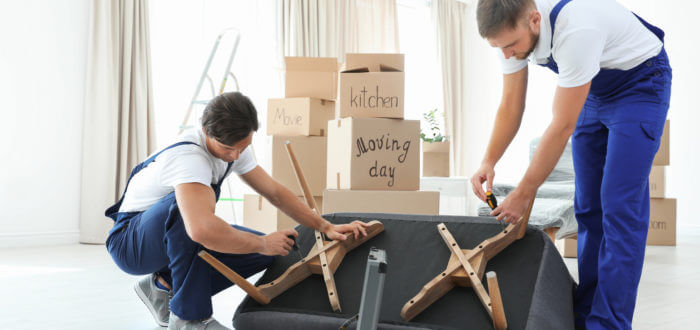

General Unspoken Rules on How to Tip Movers
Posted in Moving Essentials on October 14, 2020
Moving is stressful – it’s expensive and time-consuming, with lots of dilemmas attached. One of the things that troubles most people is – whether and how to tip movers? The ever-widening tipping culture leaves many confused – which workers do we need to tip and how much? – as many want to show their appreciation for great service (and avoid looking cheap), but they also don’t want to break the bank, especially when on a tight moving budget or an expensive endeavor like cross-country moving. So, if you were wondering if the tipping culture applies to movers and if you should prepare snacks and drinks, the answer is – yes! Scroll down for some general unspoken rules.
Do You Have to Tip Your Movers?
Tipping is not mandatory and it shouldn’t be forced on you. So, if you don’t want to do it – you don’t have you. It is totally up to you. In the end, gratuity is a way to show the people employed in the service industry that we appreciate their efforts and hard work, and moving is undoubtedly hard back-breaking work.
If workers assigned to your relocation pay careful attention to your valuable possessions, carry heavy furniture up and down the stairs, are respectful and friendly to your family, and you’re satisfied with them, a polite way to thank them would be a nice tip. Besides it being a financial boost to them, it is also a confirmation that they are doing a good job and an incentive to keep up with it.
Things to Help You Estimate If You Should Tip
Remember – you should only tip if you are satisfied with the service provided to you. Here are some things to consider when making the decision:
- The difficulty of your move – if there are multiple flights of stairs or no elevator
- Do you have many heavy objects that are hard to lift and require special preparation?
- Extreme weather conditions – was it raining, snowing, or scorching hot?
- Did they handle the packaging of fragile items cautiously and carried them with utmost care?
- Did they work diligently and quickly?
- Were they respectful and friendly to you and your family?
- Did they show up on time?
If the answer to all of these questions is yes, then you should definitely add tips to expenses in your moving binder.

How Much Should You Tip?
The amount should depend on how satisfied you are with the service and your moving budget. The tricky part is calculating the amount. An average long-distance move costs about $4000, so the 20% rule doesn’t really apply here since most people can’t afford to pay an additional $800 for tips. Therefore, most people use this formula – $4-5 per hour per mover. That is the standard amount equivalent to, say, giving 15-20% of your total bill to the waiter.
Ultimately, it all comes down to how satisfied you are, so if you are very satisfied and you can afford it, by all means, go all out. $7 per hour per person is considered generous.
How Much Do You Tip Movers in 2020?
Usually, if you do a small local move (4 hours or less), you should tip $20 per person. If your movers worked a full 8-hour shift, then it’s $40 and if they worked 12 hours or more, prepare around $60. With cross-country relocations, things get a bit more complicated, but more about that in a second.
With the outbreak of coronavirus, many things have changed, and so has the tipping culture. The low-skilled workers were quickly renamed essential workers, heroes even, as they were the ones who got out of their homes despite the pandemic and off to work to help us all continue with our lives.
Besides risking their health and life and that of their family members, their jobs have been made harder by many rules and regulations implemented to protect public health during the pandemic so many people feel grateful to them now more than ever and choose to show it by giving a little extra cash. The same goes for movers.

When Is the Best Time to Tip
Most people are also confused about when the best time to show their appreciation is. Do you tip movers when they load or unload? Do you give or at least promise tips from the outset to be sure they’ll put a little extra effort and do a good job?
It’s an unwritten rule that tips are to be handed after everything is finished, and that is the custom – the workers provide a service and you show gratuity based on the quality of that service. It’s the same with movers.
Some people choose to give $10 each at the beginning or simply promise good tips to motivate the workers. However, this is not customary, so if it makes you uncomfortable, better stick with tipping when the job is done.

Who Should You Be Tipping?
A crew usually consists of workers and a foreman, in most cases, the driver. The foreman is the person you talk to if you have any problems during the process or any special requests on your part. Naturally, if the team has done a great job with your move, you would want to reward them. But, who should you give the money to? Do you approach each individual with his/her own tip or do you just give a lump sum to the foreman so they can share it?
It’s always recommended to tip each member individually. You can even give different amounts of money to different members, based on their performance and attitude, if you like. That way, the whole team doesn’t suffer because of that one guy that stalled or put the ‘upstairs’ boxes downstairs. Also, it is a good way to personally recognize each one’s efforts and that means a lot.
But, more importantly, there are some dishonest foremen that conveniently forget to share the money received among the team and keep it all to themselves, which is not fair to other workers who did all that hard work. Especially if there was that one worker who went the extra mile for you (helped you reassemble some furniture maybe) that you wanted to reward, you would want to make sure that he gets the money and the message, right?
Long Distance Moving – Which Crew Do You Tip?
When you are relocating to another part of town, maybe just a couple of blocks away, it’s easy – you have one and the same crew loading and unloading your belongings and doing all the work, so you know who to give money to. But, what happens when you’re moving state to state?
In such situations, especially if they involve long rides, you will have two crews of long distance movers – one that will organize the move, provide packing services and load your stuff on the moving truck, and the other unloading it into your new home. So, since (and if) both cross country moving teams worked diligently, sometimes more than an 8-hour shift, it is only natural that you tip both crews. If you want to know just how many groups and people will be working on your relocation, you can always call your long distance moving company and ask, so you can prepare in advance. It goes without saying that if you’re not satisfied with one of the groups and you think they did a poor job, you can either leave a low tip or not tip at all, depending on the situation.

Additional Ways to Treat Your Movers
You must be thinking – ‘There’s more? What am I supposed to do, roll out the red carpet?’ Of course not (though you can put your carpets on your household inventory list and pack them along with your stuff), but the thing is – these people will be working at your home for multiple hours a day, sometimes even a couple of days, and it is common decency to make sure their basic needs are met:
- For example, if you have workers coming over early in the morning, you would want to offer them coffee to get them going and help them go through the long day, right? Coffee in the morning is something most people appreciate, and how they like to start the day. Movers are no different, and it will make them feel welcome.
- Don’t shy away from introducing yourself and your family members, pets even (if you are moving with pets). Try to remember movers’ names, too, as you will be communicating with them a lot since communication is key during relocations and it is always good to set a nice, friendly atmosphere. In most cases, they wear name tags, so that should make it easier for you.
- As it is manual labor, their hands will get dirty, so prepare enough liquid soap and clean towels at home for them to use.
- Snacks and drinks – There are different ways people approach this. Some choose to order a nice lunch from the restaurant instead of a tip; others choose to provide some snacks and a tip. Both are appreciated, so it’s up to you to decide, but either way, try to have bottled water, soda, and some sports drinks ready as they will be working all day long and they’ll need refreshments. Feel free to get a little creative with the snacks – while pizza sounds like a sound choice, something affordable that everyone likes, you won’t be surprised to learn that it’s everyone’s go-to snack and what these people eat almost every time. Instead, try some sandwiches or burgers. Or you can organize a quick vote and see what they’d like.
Note: don’t offer the guys beer or alcoholic beverages – besides it being a total cliche, in most cases, they are not allowed to drink while working. So, you shouldn’t try to persuade them and make them feel uncomfortable to refuse or worse – get them in trouble.
Some Free Ways to Show Gratitude
Little things that don’t cost you anything can mean a lot to the people doing your relocation. Like a simple ‘Thank you’ or ‘How are you?’. Being there on time is crucial since they are usually on a tight schedule. A nice review goes a long way too, especially if you mention someone by name. Who knows, you might help get them a promotion.

Is It OK Not to Tip Workers?
You shouldn’t feel obligated to do it in the first place as it is just a matter of will and etiquette. But there are certain circumstances under which you definitely shouldn’t do it, like if your movers show up late or aren’t careful with your belongings and end up breaking something or damaging the floors in your home or simply behave unprofessionally. You get to decide if they deserve it or not.

In the End, There is No Golden Rule on Tipping
Tipping is not an obligation, so you shouldn’t feel pressured to do it. It’s not something that is expected, it’s something to look forward to after a job well done and a nice way to show appreciation, but the final decision on whether and how much to tip is yours. Hopefully, this will help you make that decision and if you are still searching for long-distance moving services – choose wisely. And, in the meantime, don’t forget to create a moving to-do list to guide you through the process. And be sure to check out some of the great moving hacks to make sure you’ve packed all the moving essentials.




